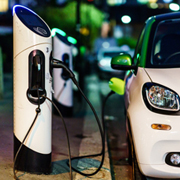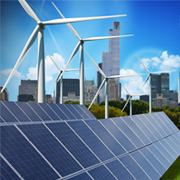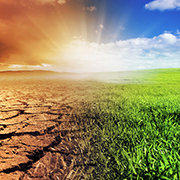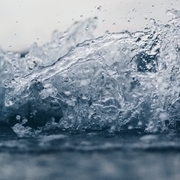Clean energy news: July 2022
 Arizona ranked top 4 in the nation for sustainability
Arizona ranked top 4 in the nation for sustainability
Arizona’s forward-thinking policies have created a welcoming environment for innovative companies, attracting industry leaders that prioritize sustainable practices. Arizona ranked no. 4 in the nation in Site Selection Magazine’s Sustainability Rankings. The Phoenix Metro also ranked no. 2 in the Mountain Region among major metropolitan statistical areas for the second year in a row. Ranking criteria included the number of LEED-certified buildings per state and per capita, renewable energy capacity and deployment, green industry projects from 2019 to 2021, number of Energy Star buildings, and more. Read more >>
 More Americans would “definitely” get electric vehicles, consumer reports survey shows
More Americans would “definitely” get electric vehicles, consumer reports survey shows
With gas prices taking a toll on people’s wallets, Consumer Reports (CR) has a new survey of what Americans think about battery electric vehicles (EVs) and low carbon fuels. The nationally representative survey of 8,027 American consumers, which was fielded in late January and February, is the largest national survey sample in the history of CR, the nonprofit consumer research, testing, and advocacy organization. The survey finds 71% of Americans express some level of interest in buying or leasing an electric-only vehicle. Read more >>

Arizona transport officials tap Fortune 500 firm to plan electric vehicle charging infrastructure
The Arizona Department of Transportation has selected AECOM (NYSE: ACM) to plan a statewide deployment of electric vehicle charging stations backed by federal government funding. AECOM, a Dallas-based Fortune 500 infrastructure consulting firm, will develop a plan on how ADOT can place EV charging stations along alternative fuel corridors and comply with federal National Electric Vehicle Infrastructure (NEVI) guidance. AECOM’s plan will also aim to reduce anxiety over the range of EVs and use a public education effort to encourage more people to purchase EVs over gas and diesel options. Read more >>
 The ZEV future is here: An 8,500% increase in truck deployments, commitments is proof
The ZEV future is here: An 8,500% increase in truck deployments, commitments is proof
Commercial U.S. fleets are going big on electric trucks, according to a new EDF analysis of class 2b-8 fleet announcements, which finds a nearly 8,500% increase in zero-emission fleet deployments and commitments since 2017. To arrive at this eye-popping stat, EDF tracked public announcements of leading fleet commitments to deploy zero-emission trucks, as well as actual deployments (trucks on roads). The recent influx of these vehicles — most of which are electric — is an important step toward reducing the health-harming, climate change pollution from diesel trucks and a key indicator of a flourishing market. Read more >>
 Intel Arizona’s water funded projects achieve net positive water use
Intel Arizona’s water funded projects achieve net positive water use
Intel announced this week that their operations in the United States, Costa Rica, and India are officially net positive on water use, meaning Intel restores more freshwater than they take in. In Arizona, fifteen Intel-funded projects helped restore 890 million gallons to the watershed in 2021. In Arizona, an Intel-funded project incentivized farmers near the Verde River to switch out crops that require heavy irrigation in the summer months for barley, which is harvested earlier in the year and requires less water. As part of the project, an investment in a local malt house lowered the transaction costs involved in malting barley, which can then be sold to local breweries that previously had to use out-of-state suppliers. Read more >>
 EVgo makes EV charging station deal with GM and Pilot Co.
EVgo makes EV charging station deal with GM and Pilot Co.
EVgo Inc. has made a deal to install 2,000 electric vehicle chargers at up to 500 Pilot and Flying J travel centers in 40 states. The Los Angeles-based fast-charging network for EVs said it will install, operate and maintain the network of 350-kilowatt charging stalls for Pilot Co. and General Motors Co. under EVgo’s eXtend program. The deal with General Motors will allow GM customers to receive special benefits like exclusive reservations, discounts on charging and integration into GM’s vehicle brand apps that provide real-time charger availability, and help with route planning. Read more >>
 Electric vehicle owners in Phoenix metro area are loving ‘passing gas stations’
Electric vehicle owners in Phoenix metro area are loving ‘passing gas stations’
Sam Caputo bought his all-electric car in 2018 and said he couldn’t be happier with his decision. “This is my Tesla Model S,” Caputo told On Your Side. “Looking back at it, it was the best choice I’ve ever made. I’m saving money hand over fist.” And he’s not the only one who’s thrilled. “A year ago in May is when we purchased it. Gas wasn’t quite as crazy as it is now,” Joan King told us. She loves her fully electric Ford Mustang Mach E, telling On Your Side that gas wasn’t really the reason she bought it, but she’s now glad she did. “I was more into it because it was really cute and that’s why I really wanted it. But now, in hindsight, it’s now definitely the gas deal for sure,” King said. Read more >>
 The Council’s progress on advancing AZ’s clean energy economy
The Council’s progress on advancing AZ’s clean energy economy
As Arizona’s premier networking and trade association for science and technology companies, the Arizona Technology Council is well positioned to mobilize Arizona technology companies in support of historic climate and clean energy investments, including the Bipartisan Infrastructure Law (BIL) and Justice40 Initiative recently unveiled by the Biden administration. These policies and initiatives are not only critical in moving the United States towards the goal of net-zero emissions by 2050, but also in solidifying Arizona’s role as a clean-energy leader that is home to technological innovators being paid generous wages and contributing to a thriving regional economy. Read more >>

What the Supreme Court ruling on emissions regulation means for Arizona’s climate fight
In a decision that has had climate activists holding their breath for months, the U.S. Supreme Court ruled that the U.S. Environmental Protection Agency does not have the authority to regulate planet-warming greenhouse gas emissions from power plants. While that Obama-era rule had not yet gone into effect, experts say the decision draws a line in the sand on the ability of federal agencies to address climate change that will hamstring efforts to avoid catastrophic impacts. The case, West Virginia v. EPA, represents the most significant ruling on climate change in more than a decade. Read more >>

$1 billion investment to acquire, conserve water is signed into law
Gov. Doug Ducey on Wednesday signed a bill investing more than $1 billion into efforts to augment and preserve water supplies in Arizona as the Southwest remains in the grip of a drought that has lasted more than two decades. “Arizona will now be able to acquire, own and store new water, and we will invest heavily in conservation, efficiency, reuse and advanced water technologies like desalination,” Ducey said after signing Senate Bill 1740. “These assets have the potential to preserve millions of gallons of water every year, and they will protect our Colorado River entitlements.” Read more >>
 UArizona researchers working on nontoxic battery to store renewable energy
UArizona researchers working on nontoxic battery to store renewable energy
Researchers at the University of Arizona have formed a startup with plans to use a metal-free electrolyte they’ve developed to make nontoxic batteries that can store large amounts of electricity. CarbeniumTec LLC was launched by a team from UArizona’s College of Science and College of Medicine-Tucson with the idea of addressing the need to develop more methods to store and deliver large amounts of electricity for long periods of time. Read more >>

City of Phoenix foregoes more water from Lake Mead in wake of declining levels
The city of Phoenix said Friday that it will forfeit delivery of an additional 14,000 acre-feet, or 4.5 billion gallons, of Colorado River water to shore up Lake Mead. This will bring the total amount of water the city has left in Lake Mead so far this year to 30,000 acre-feet, or 9.7 billion gallons, which would have been stored underground for later use. Forgoing Lake Mead water will not result in any water cutbacks for Phoenix, the city said. In exchange for leaving the additional water in the river’s reservoir, which has reached 31% capacity this year and is projected to drop another 10 feet this summer, the city said it will receive about $7.8 million. Read more >>

Arizona DOT submits application for I-10 project federal grant
The Arizona Department of Transportation (ADOT) recently submitted an application for a Federal Infrastructure, Investment, and Jobs Act grant. The agency requested $300 million to expand Interstate 10 between Chandler and Casa Grande. Grant award announcements will be sometime in the autumn. ADOT has contingencies prepared to maximize the use of available funding should the project not be awarded the grant. The state appropriated $400 million to the project this month, and $290 million previously was budgeted. Read more >>

SRP, partners clearing forests to prevent wildfires
The Salt River Project is funding a new healthy fuels initiative north of Payson to prevent catastrophic wildfires and build water resiliency amidst the worst drought in state history. SRP, in coordination with Arizona Department of Forestry and Fire Management, the U.S. Forest Service and the town of Payson, is working on a strategic forest thinning project to protect a 1,010 acre-area in the Cragin Watershed Reduction Project, which supplies water to the C.C. Cragin Reservoir, said SRP forest health management principal Elvy Barton. That acre-area is the equivalent of the size of slightly less than 1/16th the area of the South Mountain Park and Preserve. Read more >>

Opinion: Extreme heat isn’t a joke. It’s a public health crisis.
